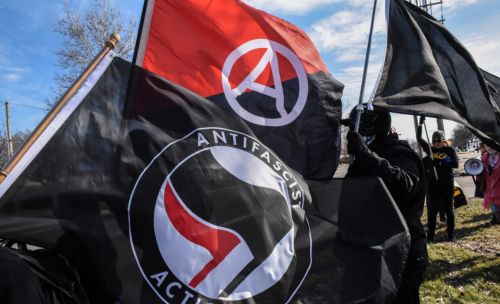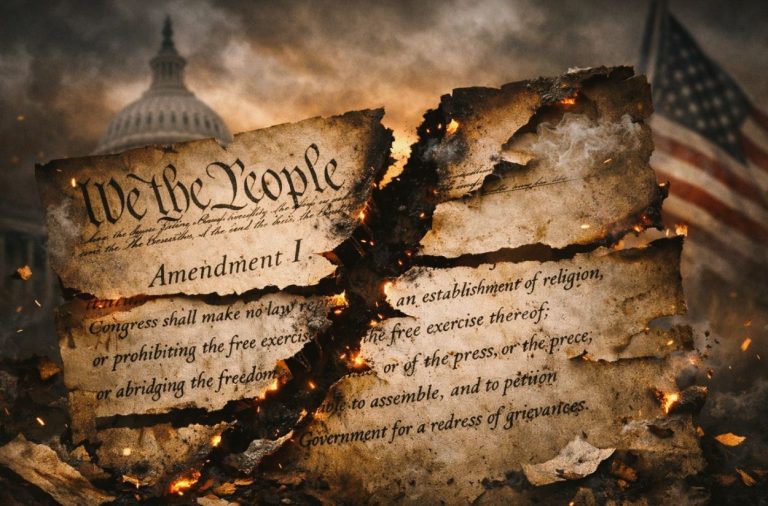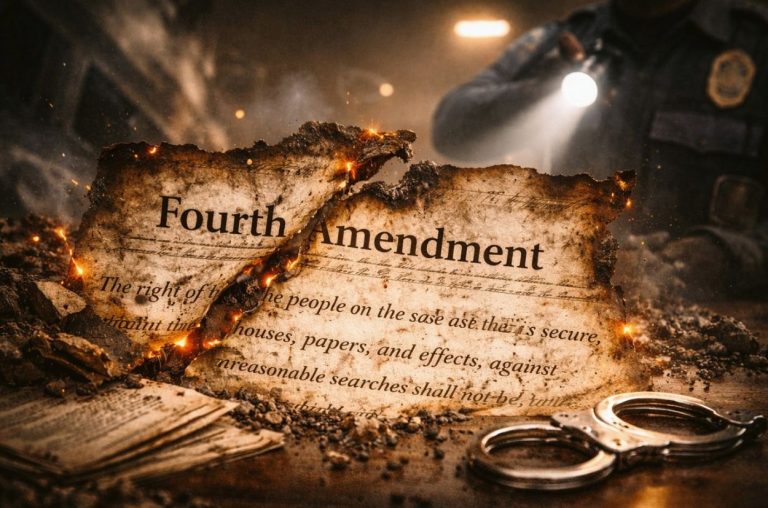

Trump’s announcement (dramatic, provocative, and legally dubious) is more than a rhetorical flourish. It tests the limits of executive power and constitutional constraint.

By Matthew A. McIntosh
Public Historian
Brewminate
Introduction: A Declaration That Looks Bigger Than Its Power
On September 17, 2025, Donald Trump announced his intention to designate Antifa, a loosely-affiliated anti-fascist movement, as a “major terrorist organization.” He used vivid language, calling Antifa a “sick, dangerous, radical left disaster.” This declaration was met with applause from some quarters, alarm in others, and widespread legal skepticism.
At the core of the controversy are basic legal realities: Antifa is not a structured organization. There is no recognized leadership, no membership rolls, no centralized command. Under U.S. law, the president does not have unilateral power to label domestic entities or ideologies as terrorist organizations. That authority extends only to foreign entities. The distinction between rhetoric and enforceable law matters deeply.
What Is Antifa and What Trump Has Said
Antifa, short for anti-fascist, refers broadly to a political attitude or set of loosely connected activists opposing fascism, far-right extremism, and white supremacism. It is decentralized by design. Many individuals associated with antifa tactics are autonomous, local, or informal in their organization. CBS News notes that the president’s announcement followed familiar campaign themes, framing antifa as a national menace rather than an idea.
Trump’s frame involves linking antifa to political violence and assigning blame to what he calls “radical left” movements. He has also announced plans to recommend investigations into those funding antifa, although exactly which entities those might be remains vague. PBS points out that even within his administration, questions remain about how to legally operationalize such a declaration.
Legal Reality: What the Law Actually Says
Under current U.S. law, there exists no mechanism by which a president may officially designate a domestic group, including a movement or ideology, as a “terrorist organization” in the same way foreign entities are designated. The list maintained by the State Department under the Foreign Terrorist Organizations statute applies only to groups outside the U.S. and those that meet criteria of foreign origin or support.
Legal experts and constitutional lawyers emphasize that the designation has no binding legal authority. Trump may direct agencies to prioritize investigations, but he cannot bypass statutory law. If tested, courts would almost certainly find such an action unconstitutional.
Civil Liberties Groups and Legal Analysis
Civil liberties groups have responded forcefully. The American Civil Liberties Union (ACLU) warned that labeling a loose ideology as “terrorist” would amount to “criminalizing dissent by executive decree.” Michael German, a fellow with the Brennan Center for Justice’s Liberty and National Security Program, said that “banning material support to foreign anti-fascist groups would have little legitimate anti-terrorism effect here or abroad.”
The Brennan Center for Justice highlighted the vagueness problem. Without clear boundaries, any protester, activist, or even scholar using anti-fascist language could fall under suspicion. That chilling effect, they argue, is precisely why Congress has kept domestic terrorism laws more narrowly defined.
Legal analysts also raise due process concerns. If federal prosecutors were to pursue cases under a “terrorist” designation, defendants could face severe penalties without established statutory definitions. Courts may strike such prosecutions down, but the burden would fall on individuals wrongly targeted to fight lengthy legal battles.
The National Lawyers Guild compared Trump’s declaration to historical “red scare” tactics, where vague accusations were used to justify surveillance, arrests, and blacklists. The danger, they argue, lies not only in official prosecutions but also in the cultural framing that equates dissent with terrorism.
Historical Precedents and Authoritarian Echoes
Declaring loosely defined groups or ideologies as enemies of the state has a long, troubling past. In interwar Europe authoritarian regimes used similar tactics to suppress dissent, label opponents as enemies of the state, and justify extraordinary coercive powers.
Globally, Hungary’s Prime Minister Viktor Orbán followed Trump’s lead almost immediately. CNN reports that Orbán announced Hungary would also designate antifa a terrorist organization. That step fits a pattern in his administration of defining internal dissent as a security risk.
The parallel is striking: when a democratic leader blurs the line between ideology and crime, others inclined toward authoritarianism (like Orbán) seize the precedent.
The Stakes: What Might Come Next
What could flow from this kind of designation, even if legally questionable? First, enforcement actions. Law enforcement could interpret this as license to surveil, arrest, or prosecute individuals associated broadly with anti-fascist activism.
Second, chilling effects. Speech, protest, academic inquiry related to anti-fascism might be suppressed. Artists, journalists, scholars, activists could face stigma, legal threats, or social censure simply for criticizing far-right movements or defending anti-fascist ideas.
Third, erosion of democratic norms. When political dissent is framed as terrorism, trust in institutions, due process, and separation of powers may degrade. Courts may be pressured. Legislatures may pass ambiguous laws to bolster executive power.
Conclusion: On Rhetoric, Power, and the Fragility of Rights
Trump’s announcement (dramatic, provocative, and legally dubious) is more than a rhetorical flourish. It tests the limits of executive power and constitutional constraint. Without congressional backing, without clear statutory authority, it is unlikely that this designation will stand up in court.
But even as rhetoric, the declaration has weight. It shapes public discourse, frames political enemies, and lays groundwork for potential abuse. Civil liberties groups are right to call this a threat to the First Amendment. History shows us that authoritarianism rarely arrives in a single decisive moment. It creeps forward when fear allows rhetoric to substitute for law. The deeper danger is not that Trump’s declaration succeeds legally, but that it succeeds culturally, turning anti-fascism itself into an object of suspicion. In that inversion, democracy loses more than legal ground. It risks losing its moral compass.
Originally published by Brewminate, 09.22.2025, under the terms of a Creative Commons Attribution-NonCommercial-NoDerivatives 4.0 International license.


